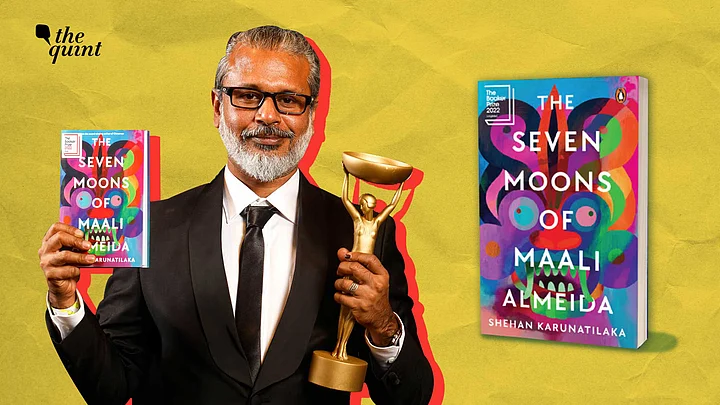South Asia throws up yet another Booker Prize winner, this time from Sri Lanka.
Colombo-based author Shehan Karunatilaka won the prestigious award on Monday, 17 October, for his second novel, The Seven Moons of Maali Almeida, also published as Chats with the Dead in India in 2020. He was honoured with the prize by the Queen consort of the United Kingdom, Camilla Parker Bowles.
The 47-year-old is only the second Sri Lankan to win the Booker, and the concomitant £50,000 with it, apart from Michael Ondaatje who won it in 1992 for The English Patient.
Karunatilaka's website describes him as a "Booker-shortlisted writer of punchlines, manifestos, and calls-to-action. Failed cricketer, failed rockstar, failed vegan. Observer of people, machines and markets. Does not know how to use semi-colons; and unable to spell diarrhea without assistance."
However, we shall soon see the word "shortlisted" in the description be replaced with the word "winning," as he makes history with his metaphysical tale based in the backdrop of Sri Lanka's brutal civil war.
Who Is Shehan Karunatilaka?
Born in Sri Lanka's Galle in 1975, Karunatilaka was brought up in Colombo, studied in New Zealand, and has worked in London, Singapore, and Amsterdam.
He is one of Sri Lanka's foremost authors, who also writes rock songs, travel stories, children's books, and screenplays, and plays the guitar in a band called Independent Square.
He came to global prominence in 2011, after winning the Commonwealth Book Prize, the DSL and Gratiaen Prize for his first novel, Chinaman: The Legend of Pradeep Mathew – a book based on cricket. Cricketers’ almanac Wisden had declared it to be the second best cricket book of all time.
The writer's latest book is called The Birth Lottery and Other Surprises. It was published in India in September this year.
A Metaphysical Tale Based in the Backdrop of the Civil War
According to the Booker Prize website, Karunatilaka's winning novel, based in Colombo in 1990 – at the height of the civil war – is about Maali Almeida, a war photographer, gambler, and closet homosexual, who has woken up dead in what seems like a "celestial visa office."
Even as his dismembered body is sinking in the Beira Lake, he has no clue who killed him. At a time when scores are settled with the help of death squads, hired goons, and suicide bombers, the list of suspects is incredibly long.
Even in the afterlife, time is running out for the war photographer. He has seven moons to get in touch with the people he loves most and lead them to a cache of pictures that will shock Sri Lanka to a halt.
Neil MacGregor, chair of the 2022 judges, describes the novel thus:
"This is a metaphysical thriller, an afterlife noir that dissolves the boundaries not just of different genres, but of life and death, body and spirit, east and west. It is an entirely serious philosophical romp that takes the reader to ’the world’s dark heart’ — the murderous horrors of civil war Sri Lanka. And once there, the reader also discovers the tenderness and beauty, the love and loyalty, and the pursuit of an ideal that justify every human life."Neil MacGregor
How the Idea of the Novel Came About
Karunatilaka started conceptualising the novel in 2009, after the end of Sri Lanka's brutal civil war, when there was a raging debate over how many civilians died and whose fault it was. He started writing it in 2014, and went through multiple versions of it.
The year 1989 was the darkest in Karunatilaka's memory, marred by an an ethnic war, a "Marxist uprising," a "foreign military presence," and "state counter-terror squads."
"A ghost story where the dead could offer their perspective seemed a bizarre enough idea to pursue, but I wasn’t brave enough to write about the present, so I went back 20 years, to the dark days of 1989," he said.
"But by the end of the 1990s, most of the antagonists were dead, so I felt safer writing about these ghosts, rather than those closer to the present," the author added.
"I’ve no doubt many novels will be penned about Sri Lanka’s protests, petrol queues and fleeing Presidents. But even though there have been scattered incidents of violence, today’s economic hardship cannot be compared to the terror of 1989 or the horror of the 1983 anti-Tamil pogroms."Shehan Karunatilaka
Growing up in the backdrop of the war, Karunatilaka says that Sri Lankas use "gallows humour" and make jokes in the face of crises as a coping mechanism.
Speaking on the influence of religion and myth on his novel, Karunatilaka says that he borrowed from several ideas, such as that of the spirit hovering around for seven days, which is seen in different forms of Buddhism, and other religions in the eastern part of the world.
"But the real breakthrough was seeing the afterlife as a visa office, as a government bureaucracy with spirits wandering around, not knowing where they are supposed to go," he said.
"We have this illusion that all our questions will be answered when we breathe our last; you close your eyes, open them and it suddenly all makes sense. But it made more sense to me that you’d be absolutely more confused when you wake up."Shehan Karunatilaka
(At The Quint, we question everything. Play an active role in shaping our journalism by becoming a member today.)
